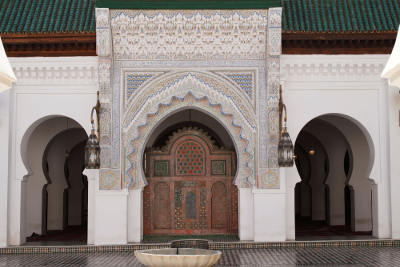Using AI to control energy for indoor agriculture
30 September 2024
Published online 10 November 2015
A report calls for reform in Muslim-world universities, but is there a roadmap?

© Travel Pictures / Alamy Stock Photo
A new report reviews the shape of science at universities in the 57 member states of the Organisation of Islamic Cooperation (OIC). Its authors; 15 academics, policymakers and communicators, under the auspices of the Muslim World Science Initiative (MWSI), have deemed that “science as a whole in the Muslim world remains below satisfactory levels.”
The report suggests that universities in Muslim countries be given greater autonomy and flexibility as they review their science curricula and engage in public outreach activities. It says key stakeholders should involve young people in the dynamics of science and urges gender neutrality.
Astrophysicist Nidhal Guessoum of the American University of Sharjah (UAE), the taskforce’s convener, says: “To our knowledge, this is the first time that significant effort has been put into reviewing the teaching of science at universities of the Muslim world, including pedagogical methods, textbooks, language of instruction, censorship of ‘controversial’ topics, and even the question of religion in science classes”.
Despite being home to some of the oldest educational institutions, many of the Muslim world’s universities are relatively young. Three-quarters of all Arab universities, for example, were established in the last 25 years of the last century. This and other significant factors, including low government expenditures on research and development, have caused Muslim world universities to lag behind others in the developed world.
The MWSI taskforce put out a call for universities across the Muslim world to join a voluntary Network of Excellence of Universities for Science (NEXUS) to be launched early next year. It will encourage the systematic implementation of best practices from successful universities in OIC countries.
It will also monitor reforms at participating universities, train university administrators and assess university performances. “We contacted university officials and academic organisations in the region, formally and informally, and we are receiving encouraging words of interest,” says Guessoum. “It's too soon to have formal pledges, but the process is going forward.”
Abdelhamid El-Zoheiry, president of the Euro-Mediterranean University in Slovenia, expressed doubts over the report. He says that several of the taskforce’s recommendations for university reform are feasible, such as promoting the right metrics to discourage plagiarism and junk science, reforming science curricula and pedagogy, and introducing liberal arts concepts.
However, El-Zoheiry, who has extensive experience with Egypt’s Ministry of Higher Education and Scientific Research, in addition to his work in international cooperation in education, research and innovation, adds that “some recommendations are not feasible in the short or medium terms and they require quite a socio-political transformation, like ‘greater autonomy for universities and greater transparency and meritocracy within societies.’”
This change, he says, would require several decades to achieve.
Guessoum says the taskforce believes lack of autonomy in Muslim world universities is mainly due to historical trajectories that have maintained a status quo which is no longer of benefit. “If we can show, in practical ways, how the system can be changed,” he says, “we believe many will welcome that.”
El-Zoheiry also suggests that the MWSI’s taskforce might not be fully representative. “There are no members from Indonesia, the largest Muslim country; Turkey, the only Muslim country in Europe; Egypt, the largest Arab country; and Nigeria, the largest Muslim country in Africa.”
This, he says, means the views and conclusions of the report are more focused on far-east Asian countries, like Malaysia and Pakistan.
Universities in the region require reform of academic promotion rules and regulations to encourage quality rather than quantity, says El-Zoheiry.
In addition, he suggests the formation of an Islamic student and staff mobility programme designed on the basis of the European Erasmus Programme for Mobility. “This will inspire reforms and multiply success stories among the participating institutions and countries,” he says.
doi:10.1038/nmiddleeast.2015.217
You can read the full report here.
Stay connected: